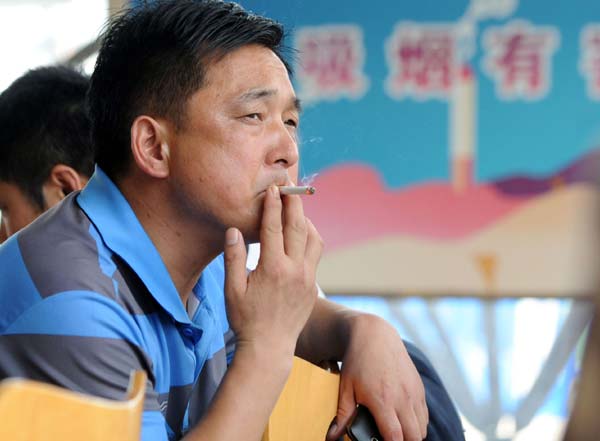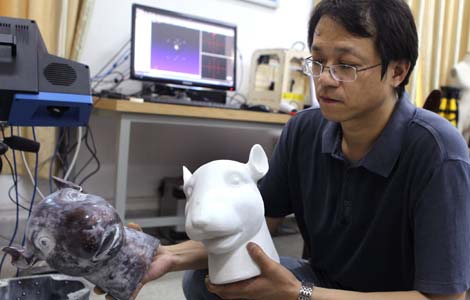Top officials asked to take lead to curb smoking
Updated: 2013-08-14 07:43
By Zheng Xin (China Daily)
|
|||||||||||
Former health vice-minister says smoking control unsatisfactory so far
Senior officials should play a leading role in curbing smoking in public places, experts said.
"Officials at all levels should take the lead and set examples for the public," said Huang Jiefu, former vice-minister of health, on Tuesday.
"The rights of nonsmokers should be truly guaranteed, especially those of youth, women and the elderly."
According to Xu Guihua, deputy director of the Chinese Association on Tobacco Control, examples set by leading officials would have a great impact on tobacco control efforts in the country.
 |
|
A man smokes in front of a poster prohibiting smoking in Guangzhou South Railway Station, Guangdong province. The Chinese Association of Tobacco Control has appealed to senior officials to play a leading role in encouraging people to give up smoking. Qian Wenpan / for China Daily |
"When a top leader smokes during a conference, many participants follow, yet few dare light a cigarette when the boss is not smoking," she said.
"Also, fewer cigarettes would be sent to the officials as gifts, greatly reducing the amount of tobacco consumed."
According to Huang, the country's efforts to curb the habit have not been satisfactory since a regulation banning smoking in public places was implemented in 2011.
Smoking is still common in public places despite the regulation, he said, which was part of the country's commitment to the World Health Organization's Framework Convention on Tobacco Control, a supranational treaty aimed to regulate the production, sale, distribution and advertising of tobacco products.
Xie Jianping, who was elected to the Chinese Academy of Engineering for his controversial research for the tobacco industry, has also imposed a negative influence on the country's image and reputation worldwide, Huang said. Xie's research focused on reducing the effects of tar in tobacco smoke.
"China, as the host country of the 11th Asia Pacific Association for the Control of Tobacco meeting to be held in 2016, still has a lot to do to further contain the negative impact of tobacco," Huang said.
This association meets annually, gathering experts and nongovernmental organizations from across Asia to discuss efforts on tobacco control.
This year's meeting will be held in Japan from Aug 18 to 21.
China's commitment to these programs shows its indispensable role in tobacco control worldwide, Xu said.
"China has not yet introduced cigarette packaging containing ugly pictures of the negative effects of smoking, and it will still take years before the country is determined to fight the hazards of it," she said.
"But once the country is determined, it is believed many will be deterred from smoking, especially teenagers."
She also emphasized the importance of nonsmoking hospitals and smoke-free schools.
Huang said the State Council attaches great importance to tobacco control legislation, and tighter regulations will be issued soon, although he did not offer a timeline.
"Smoking control nationwide requires political commitment and is closely related to the country's international image," he said. "The government should declare itself, take the right stand and attitude."
Despite the tobacco industry's contribution to the economy, people's health matters more, he added.
Related Stories
Smoking a 'chronic disease' 2013-05-31 02:27
Government offices eliminate smoking 2013-05-30 07:00
Wedding banquets go smoke-free 2013-05-29 02:50
Shenzhen gets tough on smoking 2013-05-14 17:12
Forbidden City forbids smoking 2013-04-19 17:14
Today's Top News
Councilor's comments 'won't harm bilateral ties'
Economic hub on Bohai Bay
China sees worst heat in half-century
Hot times mean hotter prices
Weather bears down on rice
Bird flu, slowdown hit sales at fast-food chains
PetroChina poised to dominate Iraqi oil
Clean tech brings opportunities
Hot Topics
Lunar probe , China growth forecasts, Emission rules get tougher, China seen through 'colored lens', International board,
Editor's Picks

|

|

|

|

|

|





